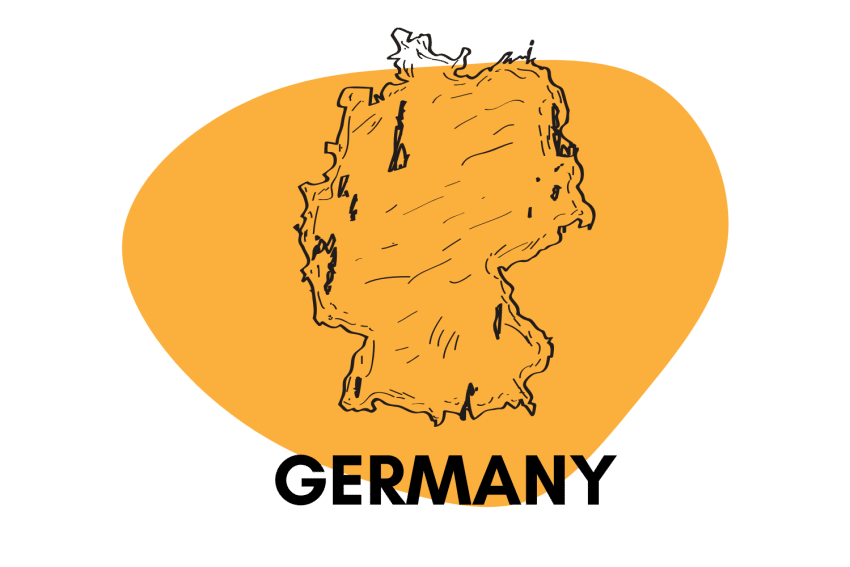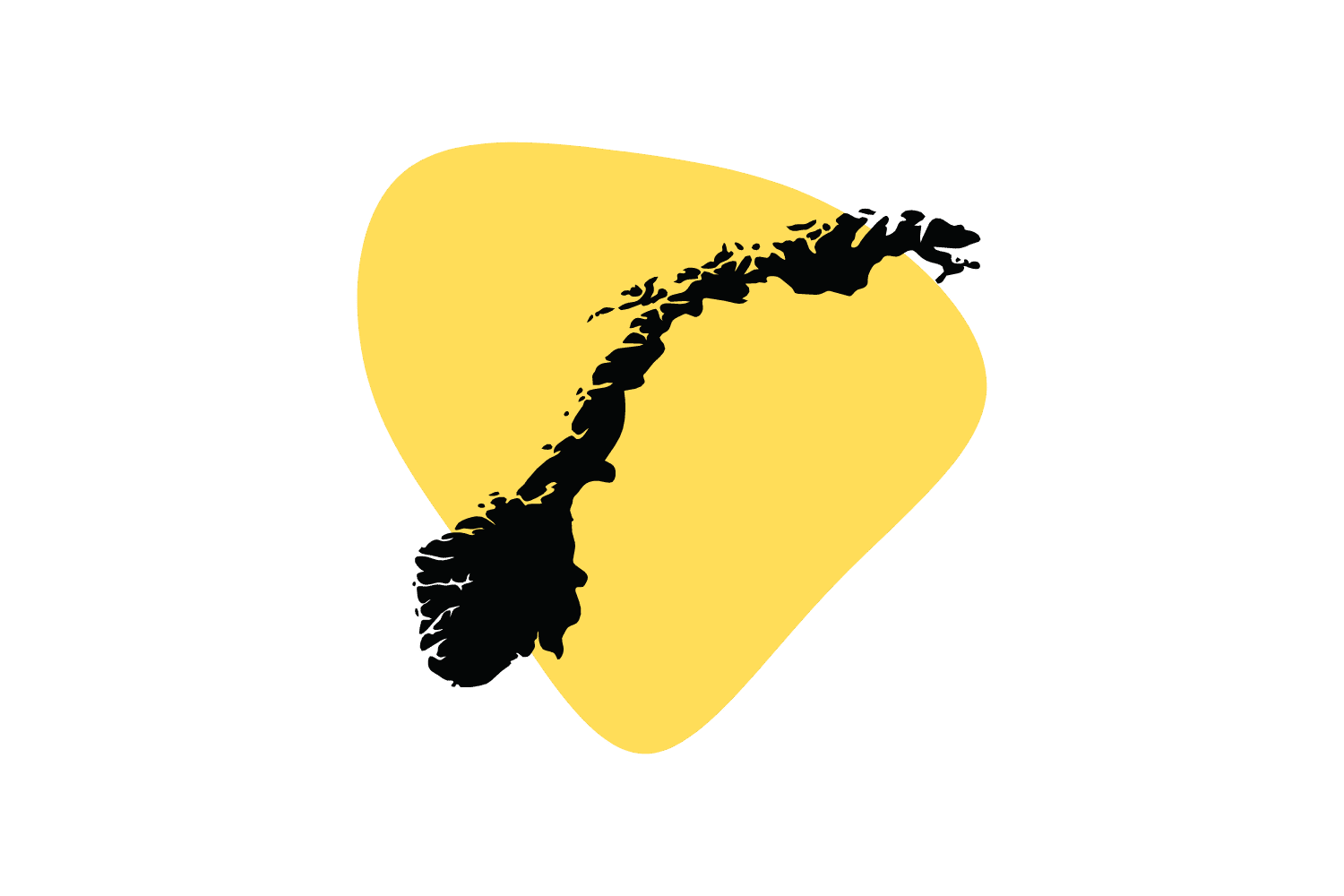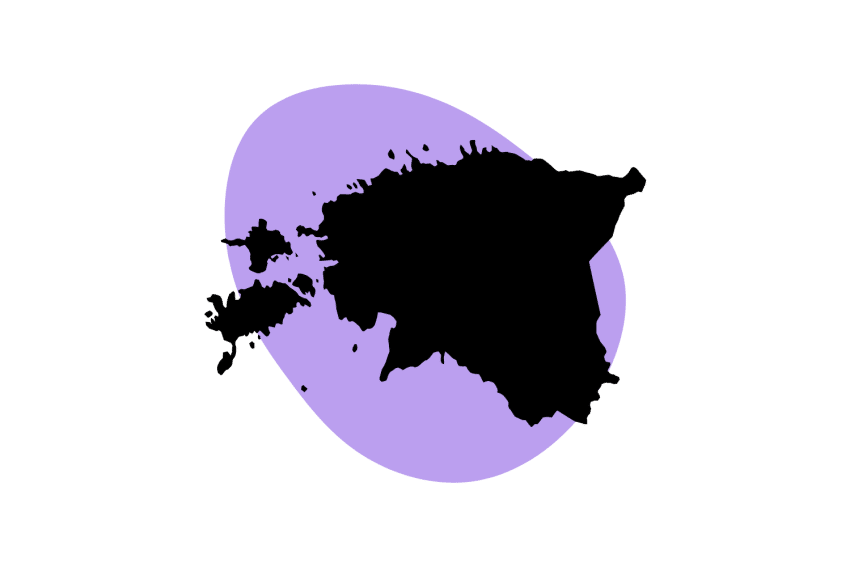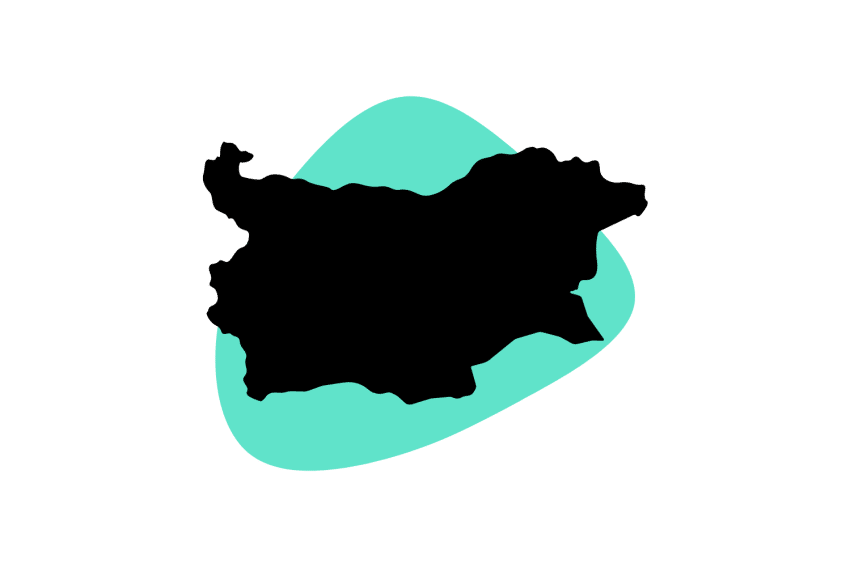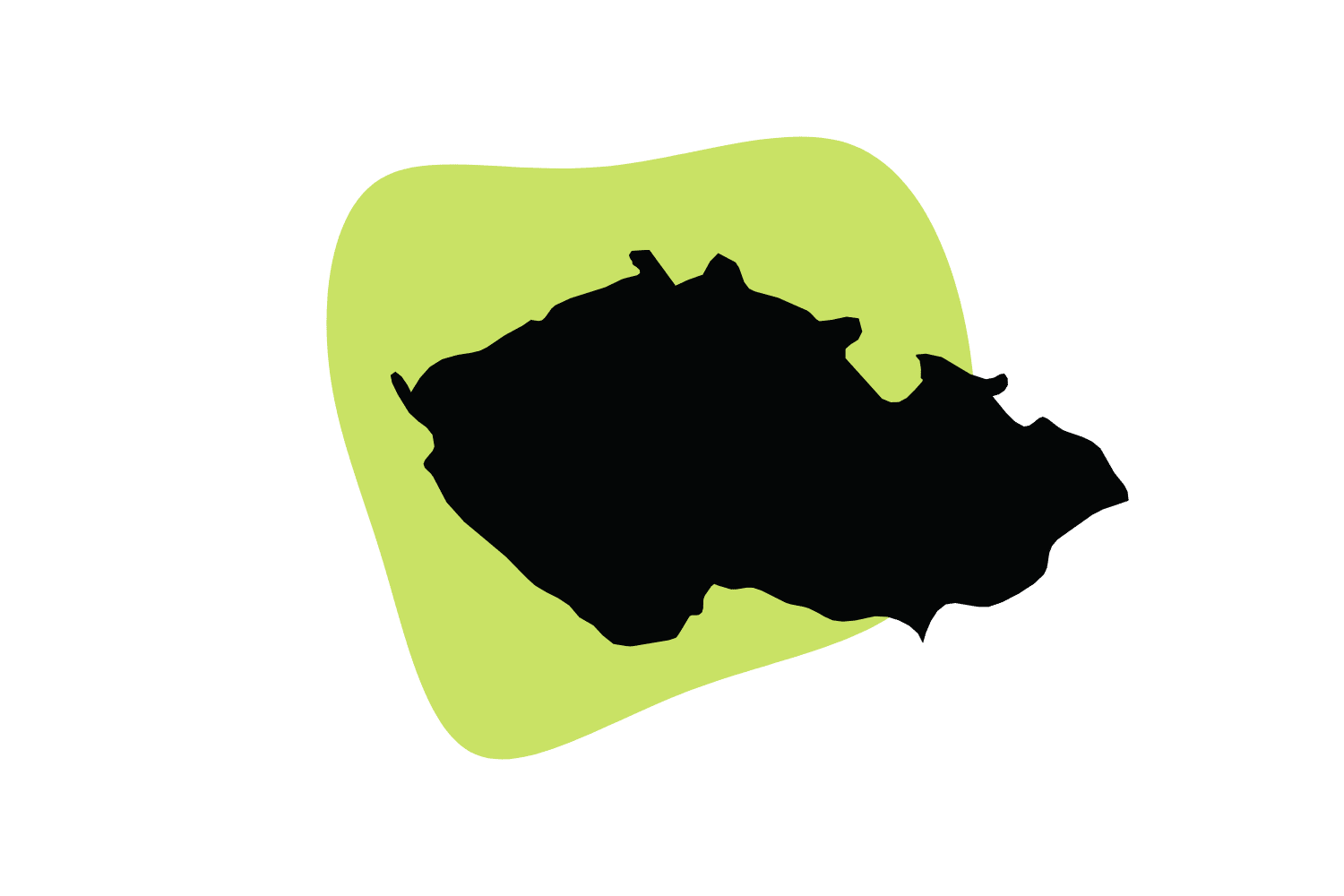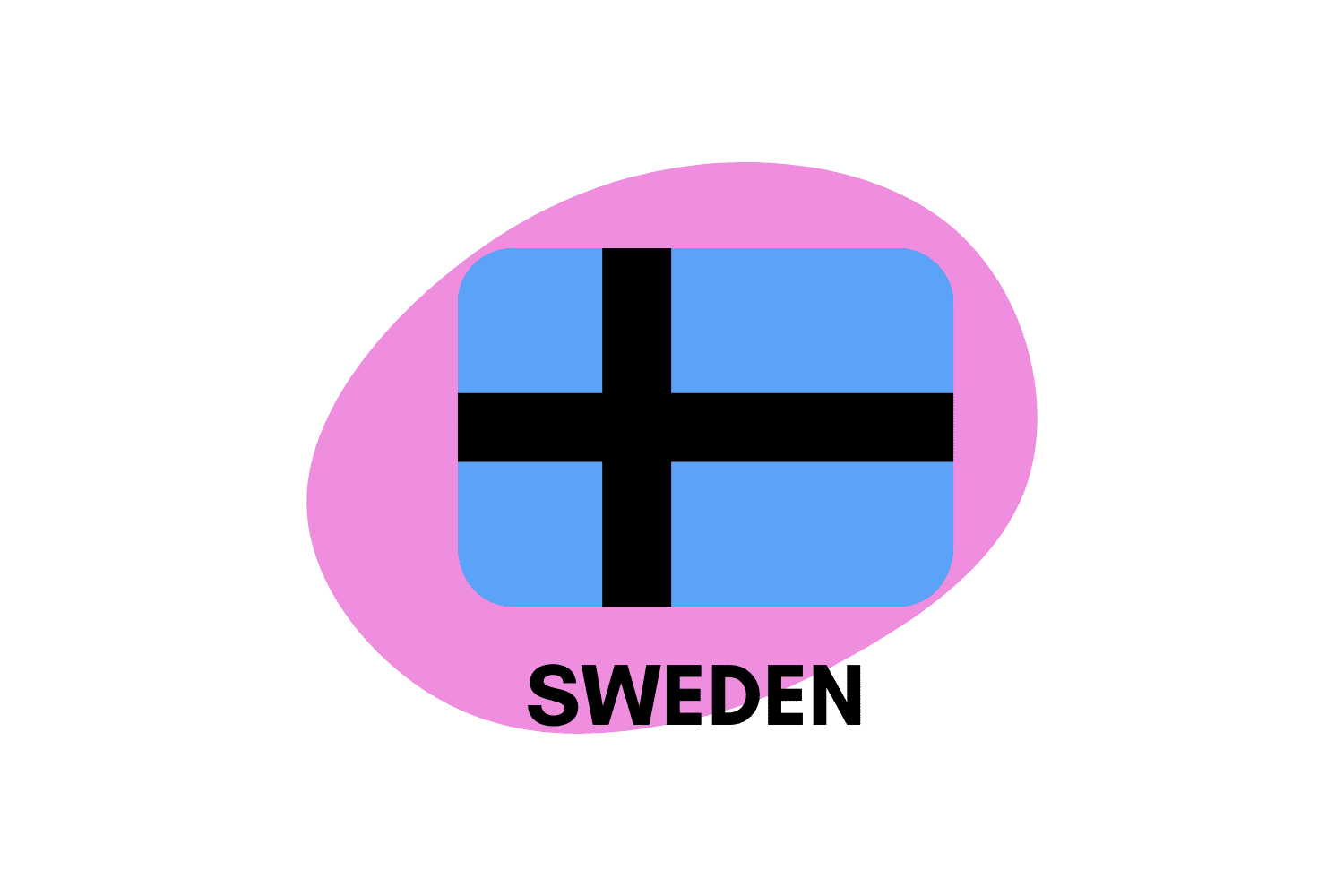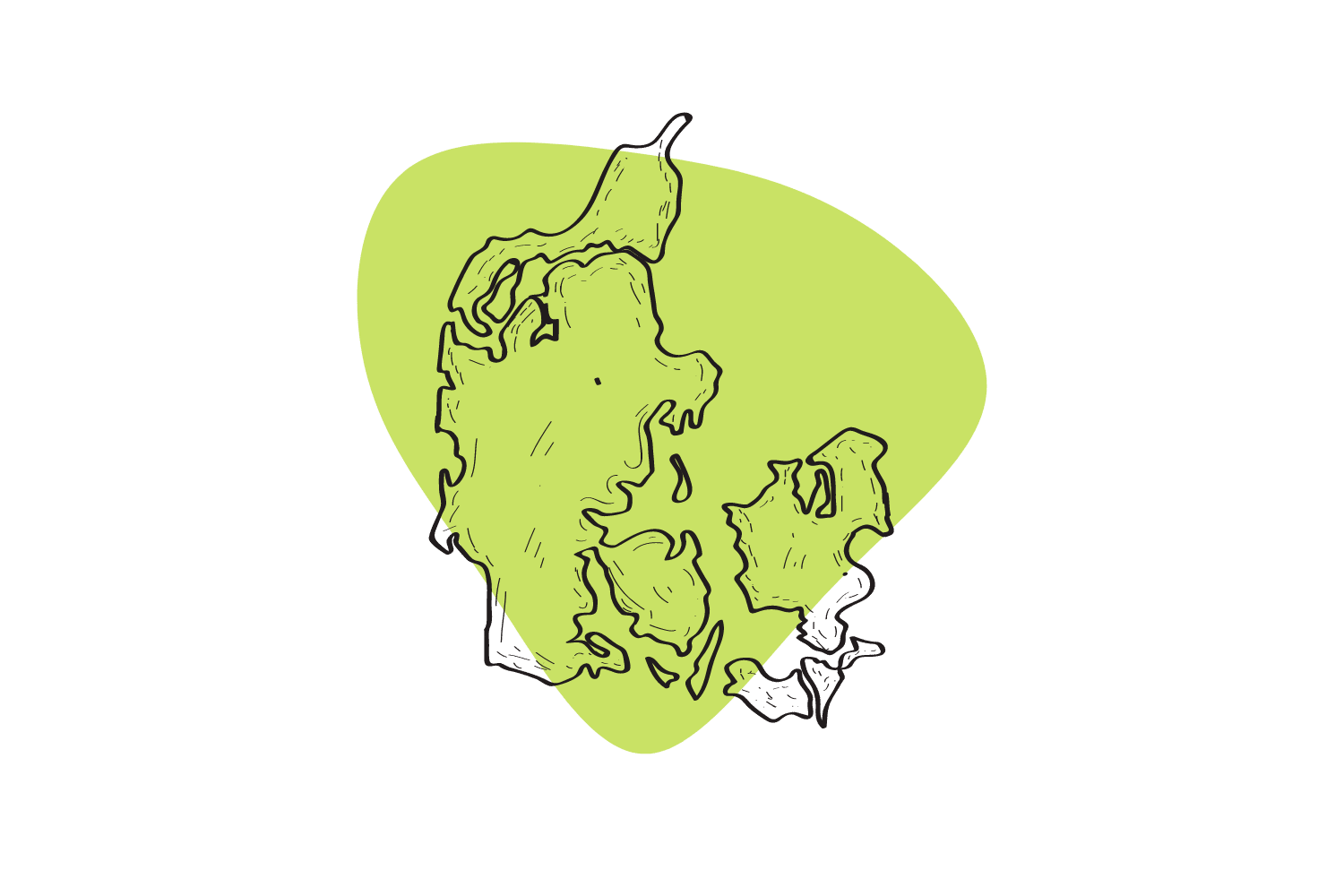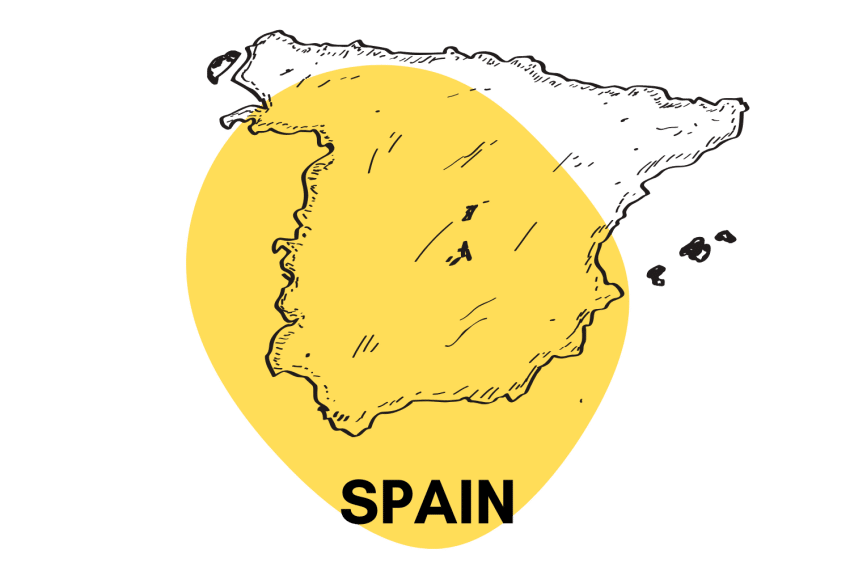Luxembourg & Psychedelics: A Look At The Current Laws (2023)
Luxembourg made huge progress in decriminalizing weed. Are psychedelics next, or is it a pipe dream?
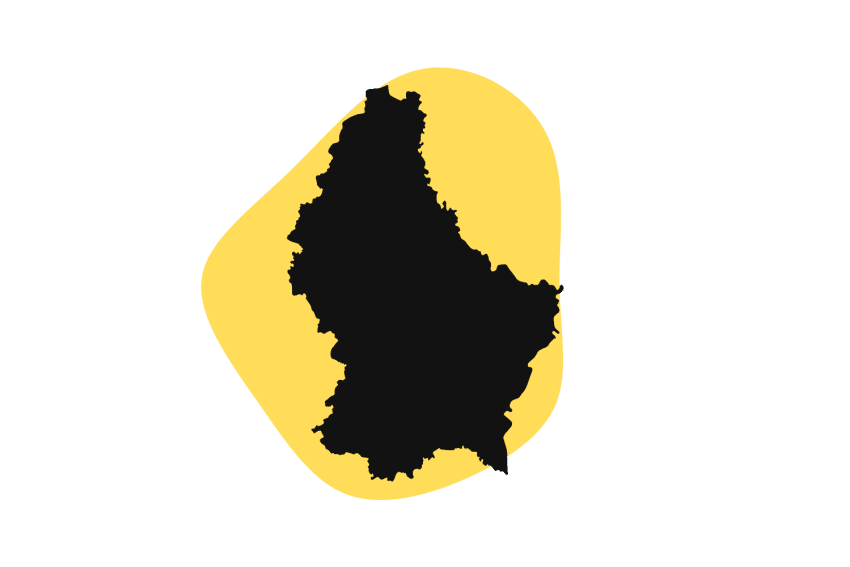
Luxembourg is the first EU country to legalize household cultivation and use of cannabis. Still, cannabis distribution and possession remain illegal, while the penalties for illicit drug distribution correlate to the damage done to the public.
The legal ramifications are less severe for personal use, but the penalties are more severe for causing harm to others (especially the distribution to minors).
Summary:
- Possession of psilocybin, LSD, DMT, MDMA, and ketamine is currently illegal in Luxembourg.
- Possession & cultivation of cannabis was decriminalized in 2001 under the self-cultivation legislation.
- Cannabis has been legal for medical use since 2018.
- Simple drug use and possession (cannabis excluded) are punishable by 8 days to 6 months in prison and/or a fine of €251-2500.
Are Magic Mushrooms Legal In Luxembourg?
No, magic mushrooms are illegal in Luxembourg, according to its list of narcotic drugs.
In Luxembourg, drugs are regulated under the basic national drug bill or Act of 19 February 1973 Concerning the Sale of Medicinal Substances and the Fight Against Drug Addiction. Under this law, consumption, possession, distribution, production, and sale of psilocybin, or the main psychedelic component in magic mushrooms, is prohibited.
Under the 2001 amendment of the 19 February 1973 Act, personal use of magic mushrooms is punishable by imprisonment between 8 days and 6 months (Article 7, A.1.). The prison penalty can be entirely replaced by a fine or reduced if the user agrees to seek professional help.

Distribution of magic mushrooms in Luxembourg is a serious offense — and there’s no difference between small-scale and large-scale drug distribution. The unauthorized possession and distribution of magic mushrooms are punished with imprisonment ranging from one to five years and/or a fine.
This offense carries a greater penalty of 5 to 10 years of imprisonment if the distributed drug causes severe damage to public health and 15 to 20 years of prison if it has fatal consequences.
In Luxembourg and most countries, psilocybin is an illegal substance. This is slowly changing thanks to researchers discovering psilocybin’s benefits for mental health. Johns Hopkins Medicine advocates for the reclassification of psilocybin to a Schedule IV substance because it has a low risk of abuse and harm.
Where to Buy Magic Mushroom Spores In Luxembourg?
Magic mushroom spores and growing kits are sold in a few online stores in Luxembourg.
Although readily available in this country, buying magic mushrooms online should be avoided. Spores are not illegal because they don’t contain psilocybin, but shroom cultivation is prohibited as it leads to the deliberate production of an illicit substance.
Penalties for consuming and possessing an illicit substance include six months of imprisonment and a fine of up to €2,500. If the offense is first-time personal possession and consumption, the penalty can be replaced entirely by a fine.
The production, planting, and storage of magic mushrooms in Luxembourg is punishable by imprisonment of up to 5 years and a hefty fine of €1,250,000 (Article 8, a and b).

Do Magic Mushrooms Grow Wild In Luxembourg?
Mushroom enthusiasts have spotted several magic mushroom species in the wild in Luxembourg, including Psilocybe cyanescens, Amanita muscaria, and Gymnopilus junonius.
Here’s a word or two on where these mushroom species tend to grow naturally. Please keep in mind that foraging mushrooms can be a dangerous activity if you’re inexperienced.
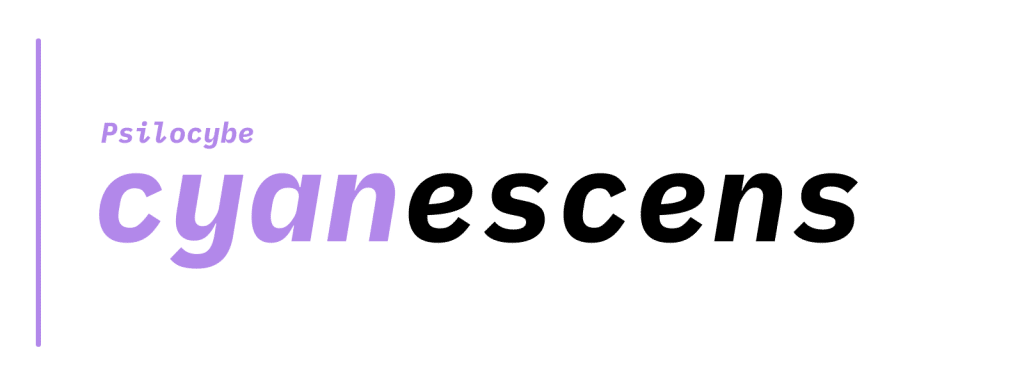
Psilocybe cyanescens (Wavy Caps)
Psilocybe cyanescens, or “Wavy Caps,” is a potent psychedelic mushroom that’s rich in psilocybin, psilocin, and baeocystin. P. cyanescens fruits in multi-number cespitose clusters and grows primarily on wood chips, in or along mulched plant beds, and coniferous woods. This species doesn’t grow on a substrate that’s not lignin-rich.
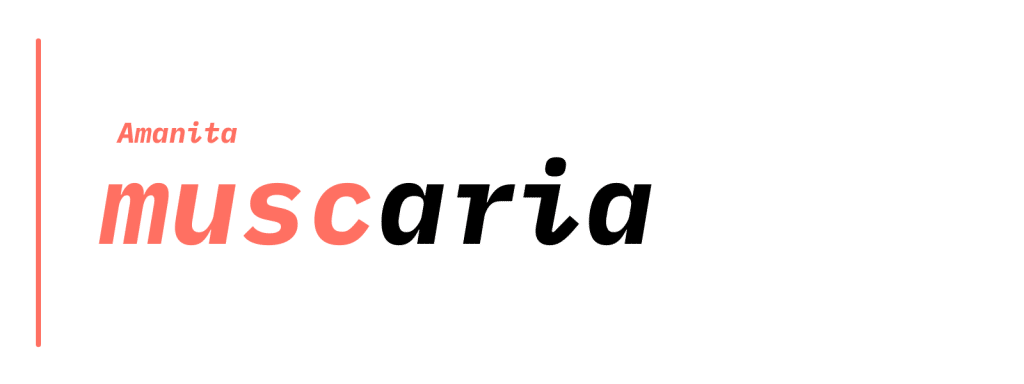
Amanita muscaria (Fly Agaric)
Also known as the Fly agaric, Amanita muscaria is a hallucinogenic mushroom with an iconic appearance. This species is cosmopolitan, meaning it grows in multiple environments, like soil, water, air, and over and inside animals and plants. Amanita muscaria is an invasive species and can be found growing under pine, oak, birch, and cedar trees.
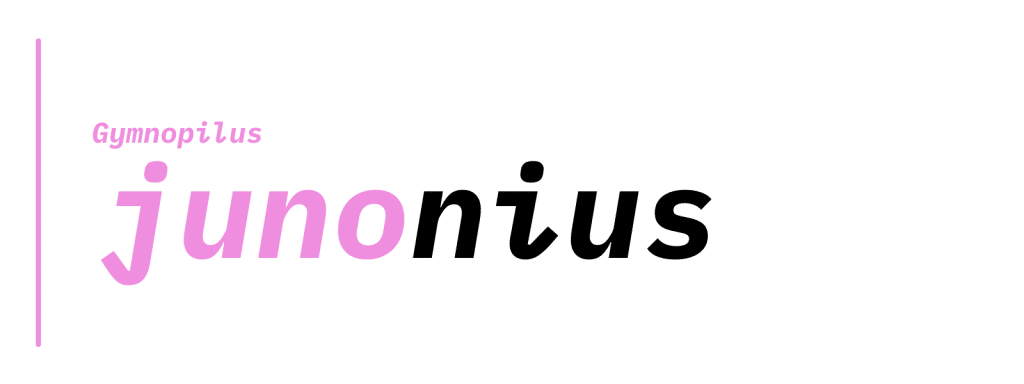
Gymnopilus junonius (Laughing Gym)
Gymnopilus junonius is a large orange, psychedelic mushroom that grows in dense clusters and contains the alkaloid psilocybin. This inedible species sprouts on logs and stumps of hardwoods and conifers and is most common in moist wooded areas.
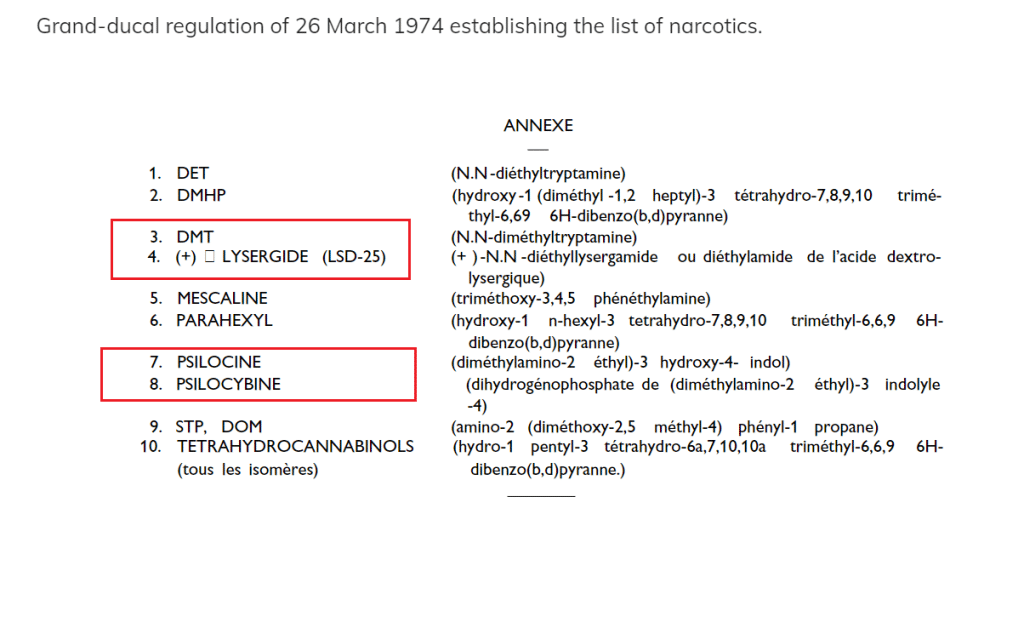
Is LSD Legal In Luxembourg?
No, LSD is an illegal substance in Luxembourg.
LSD is listed as a Schedule I Controlled Substance under the amended Law of 19 February 1973 Concerning the Sale of Medicinal Substances and the Fight Against Drug Addiction.
The country has approved The Single Convention on Narcotic Drugs, 1961, and The Convention on Psychotropic Substances, 1971.
A simple offense like possession, consumption, buying, or carrying LSD for personal use is punishable by imprisonment of up to six months and/or a fine of up to €2,500 if the person is a first-time offender and seeks professional help.
Is DMT Legal In Luxembourg?
No, DMT (dimethyltryptamine) is an illegal substance in Luxembourg.
DMT is listed as a Schedule I Controlled Substance under the updated Law of 19 February 1973 Concerning the Sale of Medicinal Substances and the Fight Against Drug Addiction
Possession and consumption of DMT are punishable by up to six months of imprisonment and/or a fine of up to €2,500. Consuming DMT in the workplace or around minors is punishable by imprisonment of up to a year and/or a fine of up to €12,000.
DMT is a prohibited substance in most countries, including Luxembourg. This hallucinogenic tryptamine drug naturally occurs in many herbs, but its most popular source is ayahuasca. Ayahuasca is a bitter-tasting brew with a dark brown color, also available in a smokable form called change.
Is MDMA Legal In Luxembourg?
No, MDMA is an illegal substance in Luxembourg.
MDMA is a Schedule I Controlled Substance under the Law of 19 February 1973 Concerning the Sale of Medicinal Substances and the Fight Against Drug Addiction, amended in 2001 and 2018.
Simple use of MDMA is punishable by 8 days to six months of imprisonment and/or a fine of €2,500. The penalty can be reduced and even eliminated if the user seeks and accepts help.
Distribution of MDMA (and any other illicit drug) is punishable by imprisonment from one to 5 years and/or a fine and can go up to 10 or 20 years of imprisonment if the drug distribution has severely damaged public health or has had fatal consequences.
Like LSD and magic mushrooms, MDMA has shown promise in the field of psychedelic-assisted psychotherapy. For now, Luxembourg is not considering psychedelics for mental health, but we’ll see what the future holds.
Is Ketamine Legal In Luxembourg?
No, ketamine is illegal in Luxembourg for recreational use.
Ketamine is used as an anesthetic in human and veterinary medicine. In recent years, Luxembourg has added “new controlled substances” to its list of prohibited drugs, including GHB. Ketamine is not mentioned on the list, but it’s likely prohibited outside of medical uses.
Ketamine is a novel, promising therapy for depression and PTSD in patients who don’t react to traditional treatment. As of this writing, ketamine is not allowed for mental health treatment in Luxembourg, and its distribution is punishable by imprisonment from 1 to 5 years.
Is Marijuana Legal In Luxembourg?
Luxembourg is the first EU country to legalize household production and personal use of cannabis.
In July 2022, lawmakers approved the self-cultivation legislation. Adults 18 and over are allowed to cultivate up to four plants per household for personal use. Aside from personal use at home, cannabis possession and distribution in public remain a criminal offense.
Carrying or consuming under 3 grams of cannabis in public has been decriminalized and punished by a misdemeanor. The base fine is €25-500, with the possibility of a taxed warning of €145.
Individuals caught carrying more than 3 grams of cannabis are treated as drug dealers and can be charged €251-2,500 depending on the amount of marijuana found in possession. If minors are involved, the offense is also treated as a crime, and prison sentences are possible.

THC isomers like delta-8 THC and delta-10 THC are not legal in Luxembourg for recreational purposes.
The 2001 Amendment decriminalized the possession of cannabis for personal use at the national level. This amendment replaced the prison penalty with a monetary fine and reclassified cannabis as a category B substance (Article 7, B.1, Article 8).
The 2018 amendment legalized medical cannabis use in Luxembourg. The country’s lawmakers unanimously passed the medical cannabis bill in 2018, allowing qualified physicians to prescribe oils and capsules available at hospital pharmacies. Patients suffering from chronic pain, cancer, multiple sclerosis, or neurodegenerative diseases can use medical cannabis.
Hemp, defined as cannabis with less than 0.3% THC, is a legal crop in Luxembourg and can be cultivated for industrial purposes. Hemp flower is allowed if it contains less than 0.3% THC and can be used as an herbal smoking product, not as a tobacco product.
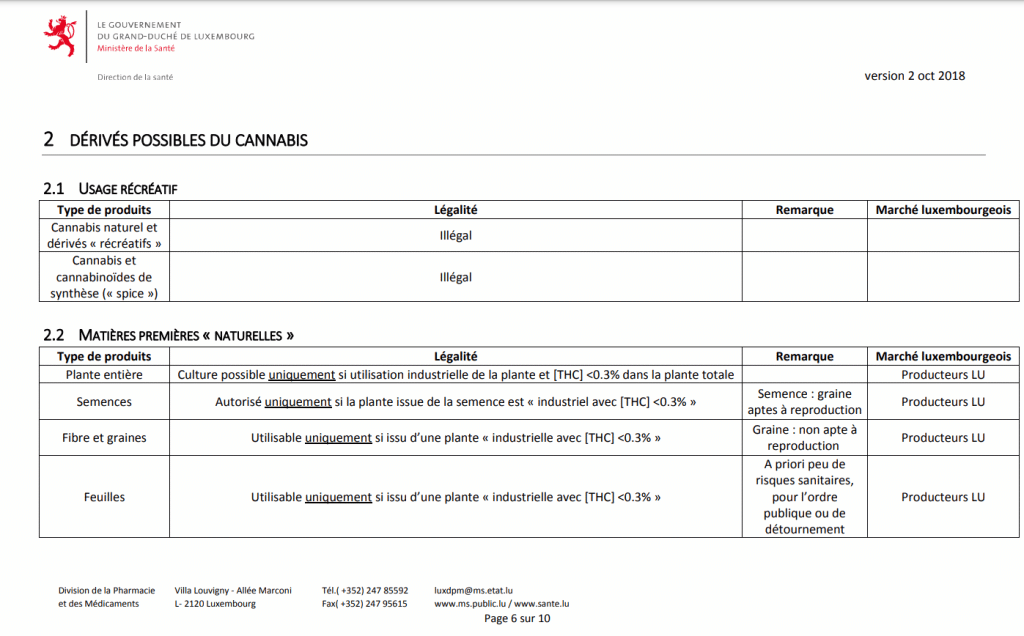
CBD is considered a “novel food” in Luxembourg, so it can’t be in the marketplace. Under EU laws, “novel foods” like CBD undergo evaluation by scientists, who, in this case, have yet to establish its safety.
What’s the Difference Between Legalization & Decriminalization?
The difference between decriminalization and legalization is simple.
When a drug is decriminalized, the penalty for possession and use of small amounts is lowered to a fine. Decriminalization doesn’t change the drug’s status under the law, and the substance still has to come from the black market.
Cannabis possession and distribution continue to be illegal in this country, so being caught is a punishable offense.
If it was fully legalized, the production, sale, and distribution of cannabis would be permitted under certain restrictions. Legal cannabis is typically sold in licensed dispensaries to adults over 21, which will more or less be the case with all drugs if legal.
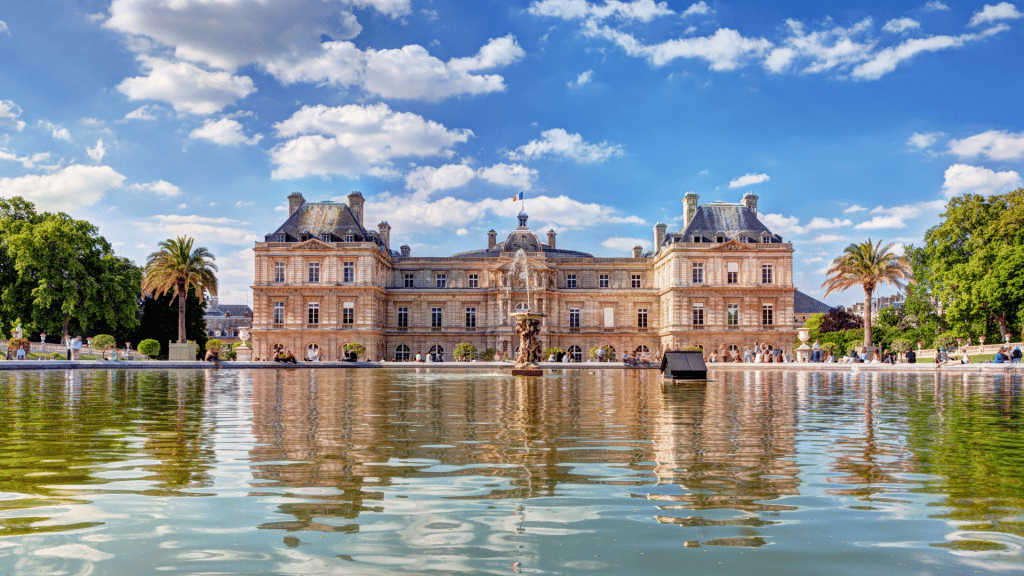
Key Takeaways: What’s the Future of Psychedelics In Luxembourg?
Luxembourg is the first EU country to legalize at-home cultivation and personal use of cannabis. This may show the country will be open to legalizing psychedelics for medical purposes before other countries in the union.
It’s a long road ahead, but Luxembourg is cautious about handling drug laws in a way that won’t cause harm to the public. The first step towards legalization is decriminalizing all drugs, which is still pending in this country.

